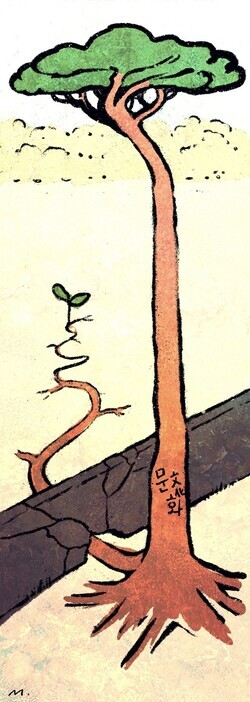hankyoreh
Links to other country sites 다른 나라 사이트 링크
[Column] Hanbok controversy: There’s no such thing as exclusive ownership of a culture


By Pak Noja (Vladimir Tikhonov), professor of Korean Studies at the University of Oslo
The opening ceremony of the Beijing Winter Olympics, which was held a few weeks ago, provoked outrage among some Korean netizens over the wearing of a hanbok, as Korea’s traditional attire is called. As representatives of China’s 56 ethnic minorities brought in the Chinese flag, one woman, apparently a Korean Chinese — called Joseonjok in Korean — was wearing an outfit that resembled a hanbok.
In fact, there was nothing unusual or scandalous about that. As members of one of China’s ethnic minorities, Korean Chinese women regularly wear hanboks at nearly all official events in China featuring those minorities.
China isn’t the only place where that happens. Ethnic Koreans in Russia — known as Goryeo-in in Korean and Kareisky in Russian — always wear hanboks at events designed to showcase Russia’s identity as a multiethnic state. Korean Americans sometimes wear hanboks as well.
Korean netizens have never gotten riled up about the wearing of hanboks in any country other than their neighbor China. If anything, netizens are likely to regard the appearance of hanboks anywhere else in the world as boosting national prestige. But when the hanbok makes an appearance in other countries of East Asia — and China in particular — they immediately raise allegations about cultural appropriation or historical distortion.
There’s an obvious reason for that. A supranational union of regional states has never formed in East Asia, in contrast with Europe, North America, South America and the Arab world. The region doesn’t even have a common language to play the role of English in Europe and North America, Spanish in Central and South America, Arabic in the Middle East, and Russian in the former Soviet Union.
In premodern times, Classical Chinese served as a common script in East Asia. But nowadays, 2 out of 10 Korean university students can’t even write their own names in the script. Here at the University of Oslo, it’s typical for Chinese, Korean and Japanese students to resort to English when they meet each other. Given the division of the Korean Peninsula and the discord between the allies of North Korea and China on one side and South Korea, US and Japan on the other, there’s basically nothing worth describing as an “East Asian community.”
In such a situation, the countries of East Asia have moved in the direction of extremely cliquish cultural nationalism. They monopolize formerly shared regional cultures as “national culture” and claim exclusive ownership of the region’s history. While Korean netizens are particularly sensitive to accusations of Chinese cultural appropriation, there are actually few differences in the ways in which South Korea, China and Japan, as well as North Korea and Vietnam, construct their “national culture.” They are identical in their exclusionary nature and unhistorical “ethnicization” of the regional culture of the past.
Let’s look at a few examples. Not only Western scholars but also some conscientious Japanese scholars trace the origins of the Japanese term “emperor” (tenno, or literally “heavenly emperor”) to Taoism, which was brought from China. As Taoist divinities such as the “Great Heavenly Emperor” of ancient China were introduced to Japan, they even affected the name of the Japanese monarch, these scholars say.
But are such theories introduced in Japanese textbooks? Hardly!
What about in South Korea? Yoon Suk-yeol, the presidential candidate for Korea’s conservative People Power Party, responded to the hanbok scandal by saying, “Goguryeo and Balhae belong to the proud and brilliant history of the Republic of Korea.”
It’s true that some of the nomadic people of Balhae were absorbed into the kingdom of Goryeo, making them part of the history of the Korean Peninsula, which extends to the Republic of Korea. But must we really strain to ignore the fact that another group of Balhae nomads belonged to China’s Liao dynasty and Jin dynasty and played an important role in their history?
In fact, the cultures of Goguryeo and Balhae were not only absorbed into the culture of the Korean Peninsula but also laid the cultural foundation of Northeast China (Manchuria), even impacting the Jurchens, forerunners of the Manchus, who would go on to found China’s Qing dynasty. But school textbooks in South Korea (as well as North Korea) generally treat Goguryeo and Balhae as exclusively being part of the history of the Korean Peninsula.
At the same time, Chinese government publications have also described Goguryeo as being “the government of a Chinese ethnic minority” and have claimed ownership of its history. It’s ahistorical and absurd to apply the term “ethnic minority” — which wasn’t added to the Chinese language until the 20th century — to ancient history, but that doesn’t seem to bother the Chinese government or state-affiliated intellectuals. Today’s nationalistic ambitions are being projected wholesale onto history.
In fact, Korea is the country that potentially has the most to lose from this bonanza of exclusionary nationalism. Korea is much more dependent on trade than China, Japan, North Korea or Vietnam. Furthermore, Koreans make up the largest diasporic communities in East Asia.
Geographically speaking, the Korean Peninsula is in the middle of East Asia. In such a situation, adopting the more objective and rational approach of regarding the regional culture of the past as the shared legacy of all residents of East Asia would conform to Korea’s long-term national interest in a broader sense.
But as the conflict between China and the US intensifies and feelings of hatred toward China run riot in South Korea, politicians focused on winning votes in the upcoming presidential election joined the throngs of people making a big deal about the pointless and unnecessary “hanbok scandal.”
One example is the statement released by People Power Party lawmakers on the National Assembly’s Culture, Sports and Tourism Committee on Feb. 5 in which they “strongly denounced” China’s “cultural Northeast Asian project.” They then proceeded to make the astonishing claim that Chinese people are brazenly opening Korean restaurants in Europe right now, undermining the dignity of Korean food while making money off the Korean Wave, without providing any concrete evidence whatsoever.
By that logic, the many Koreans who run sushi restaurants in Oslo ought to voluntarily shut down their businesses because they’re selling “another country’s food.” It’s shocking that close-minded ultranationalism of this sort could be voiced in the parliament of an advanced country in the 21st century.
Meanwhile, Lee Jae-myung, presidential candidate for the Democratic Party, hurriedly jumped on the bandwagon, avowing his “opposition to China’s cultural project,” instead of providing a decent response to this outpouring of exclusionary sentiment.
It’s really a shame. When the politicians who ought to model rationality, objectivity, inclusivity and cosmopolitan sensibility are joining the jingoistic frenzy, they can only make the situation much worse. Indeed, Korea, being the only country in East Asia that has achieved democracy on its own, is the country best suited to combat the regressive exclusivism that seeks ownership of culture.
My dream is for schools and universities of all levels to gradually replace “Korean history,” being the history of a single country, with the history of the Korean Peninsula in the context of regional history and world history. It’s only when we broaden our perspective to all of East Asia, and to the world at large, that we can properly understand the Korean Peninsula, both now and in the past, as being a mélange of various cultures.
I’m sure the “hanbok scandal” would look ridiculous to students who had completed such a course.
Please direct questions or comments to [english@hani.co.kr]

Editorial・opinion
![[Editorial] Intensifying US-China rivalry means Seoul must address uncertainty with Beijing sooner than later [Editorial] Intensifying US-China rivalry means Seoul must address uncertainty with Beijing sooner than later](https://flexible.img.hani.co.kr/flexible/normal/500/300/imgdb/original/2024/0517/8117159322045222.jpg) [Editorial] Intensifying US-China rivalry means Seoul must address uncertainty with Beijing sooner than later
[Editorial] Intensifying US-China rivalry means Seoul must address uncertainty with Beijing sooner than later![[Column] When ‘fairness’ means hate and violence [Column] When ‘fairness’ means hate and violence](https://flexible.img.hani.co.kr/flexible/normal/500/300/imgdb/original/2024/0516/7417158465908824.jpg) [Column] When ‘fairness’ means hate and violence
[Column] When ‘fairness’ means hate and violence- [Editorial] Yoon must stop abusing authority to shield himself from investigation
- [Column] US troop withdrawal from Korea could be the Acheson Line all over
- [Column] How to win back readers who’ve turned to YouTube for news
- [Column] Welcome to the president’s pity party
- [Editorial] Korea must respond firmly to Japan’s attempt to usurp Line
- [Editorial] Transfers of prosecutors investigating Korea’s first lady send chilling message
- [Column] Will Seoul’s ties with Moscow really recover on their own?
- [Column] Samsung’s ‘lost decade’ and Lee Jae-yong’s mismatched chopsticks
Most viewed articles
- 1[Editorial] Transfers of prosecutors investigating Korea’s first lady send chilling message
- 2For new generation of Chinese artists, discontent is disobedience
- 3S. Korea “monitoring developments” after report of secret Chinese police station in Seoul
- 4[Photo] 1,200 prospective teachers call death of teacher “social manslaughter”
- 5[Exclusive] Unearthed memo suggests Gwangju Uprising missing may have been cremated
- 6[Column] Samsung’s ‘lost decade’ and Lee Jae-yong’s mismatched chopsticks
- 7[Column] When ‘fairness’ means hate and violence
- 8Xi, Putin ‘oppose acts of military intimidation’ against N. Korea by US in joint statement
- 9[Special reportage- part I] Elderly prostitution at Jongmyo Park
- 10[News analysis] Samsung in management crisis due to owner risk